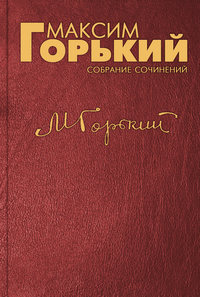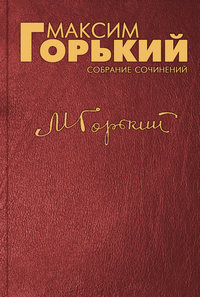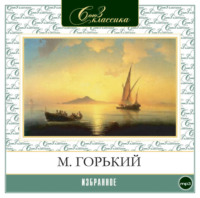 полная версия
полная версияThe Man Who Was Afraid
But Foma saw them as though through a fog, and their words did not touch him to the quick. A vast, bitter feeling was now springing up within him, from the depth of his soul; he followed its growth and though he did not yet understand it, he already experienced something melancholy and degrading.
“Just think, you charlatan! What have you done to yourself?” said Reznikov. “What sort of a life is now possible to you? Do you know that now no one of us would care even as much as to spit on you?”
“What have I done?” Foma tried to understand. The merchants stood around him in a dense, dark mass.
“Well,” said Yashchurov, “now, Fomka, your work is done.”
“Wait, we’ll see,” bellowed Zubov in a low voice.
“Let me free!” said Foma.
“Well, no! we thank you humbly!”
“Untie me.”
“It’s all right! You can lie that way as well.”
“Call up my godfather.”
But Yakov Tarasovich came up at this moment. He came up, stopped near Foma, sternly surveyed with his eyes the outstretched figure of his godson, and heaved a deep sigh.
“Well, Foma,” he began.
“Order them to unbind me,” entreated Foma, softly, in a mournful voice.
“So you can be turbulent again? No, no, you’d better lie this way,” his godfather replied.
“I won’t say another word. I swear it by God! Unbind me. I am ashamed! For Christ’s sake. You see I am not drunk. Well, you needn’t untie my hands.”
“You swear that you’ll not be troublesome?” asked Mayakin.
“Oh Lord! I will not, I will not,” moaned Foma.
They untied his feet, but left his hands bound. When he rose, he looked at them all, and said softly with a pitiful smile:
“You won.”
“We always shall!” replied his godfather, smiling sternly.
Foma bent, with his hands tied behind his back, advanced toward the table silently, without lifting his eyes to anyone. He seemed shorter in stature and thinner. His dishevelled hair fell on his forehead and temples; the torn and crumpled bosom of his shirt protruding from under his vest, and the collar covered his lips. He turned his head to push the collar down under his chin, and was unable to do it. Then the gray-headed little old man walked up to him, adjusted what was necessary, looked into his eyes with a smile and said:
“You must endure it.”
Now, in Mayakin’s presence, those who had mocked Foma were silent, looking at the old man questioningly, with curiosity and expectancy. He was calm but his eyes gleamed in a way not at all becoming to the occasion, contentedly and brightly.
“Give me some vodka,” begged Foma, seating himself at the table, and leaning his chest against its edge. His bent figure look piteous and helpless. Around they were talking in whispers, passing this way and that cautiously. And everyone looked now at him, now at Mayakin, who had seated himself opposite him. The old man did not give Foma the vodka at once. First he surveyed him fixedly, then he slowly poured out a wine glassful, and finally, without saying a word, raised it to Foma’s lips. Foma drank the vodka, and asked:
“Some more!”
“That’s enough!” replied Mayakin.
And immediately after this there fell a minute of perfect, painful silence. People were coming up to the table noiselessly, on tiptoe, and when they were near they stretched their necks to see Foma.
“Well, Fomka, do you understand now what you have done?” asked Mayakin. He spoke softly, but all heard his question.
Foma nodded his head and maintained silence.
“There’s no forgiveness for you!” Mayakin went on firmly, and raising his voice. “Though we are all Christians, yet you will receive no forgiveness at our hands. Just know this.”
Foma lifted his head and said pensively:
“I have quite forgotten about you, godfather. You have not heard anything from me.”
“There you have it!” exclaimed Mayakin, bitterly, pointing at his godson. “You see?”
A dull grumble of protest burst forth.
“Well, it’s all the same!” resumed Foma with a sigh. “It’s all the same! Nothing – no good came out of it anyway.”
And again he bent over the table.
“What did you want?” asked Mayakin, sternly.
“What I wanted?” Foma raised his head, looked at the merchants and smiled. “I wanted – ”
“Drunkard! Nasty scamp!”
“I am not drunk!” retorted Foma, morosely. “I have drank only two glasses. I was perfectly sober.”
“Consequently,” said Bobrov, “you are right, Yakov Tarasovich, he is insane.”
“I?” exclaimed Foma.
But they paid no attention to him. Reznikov, Zubov and Bobrov leaned over to Mayakin and began to talk in low tones.
“Guardianship!” Foma’s ears caught this one word. “I am in my right mind!” he said, leaning back in his chair and staring at the merchants with troubled eyes. “I understand what I wanted. I wanted to speak the truth. I wanted to accuse you.”
He was again seized with emotion, and he suddenly jerked his hands in an effort to free them.
“Eh! Hold on!” exclaimed Bobrov, seizing him by the shoulders. “Hold him.”
“Well, hold me!” said Foma with sadness and bitterness. “Hold me – what do you need me for?”
“Sit still!” cried his godfather, sternly.
Foma became silent. He now understood that what he had done was of no avail, that his words had not staggered the merchants. Here they stood, surrounding him in a dense throng, and he could not see anything for them. They were calm, firm, treating him as a drunkard and a turbulent fellow, and were plotting something against him. He felt himself pitiful, insignificant, crushed by that dark mass of strong-souled, clever and sedate people. It seemed to him that a long time had passed since he had abused them, so long a time that he himself seemed as a stranger, incapable of comprehending what he had done to these people, and why he had done it. He even experienced in himself a certain feeling of offence, which resembled shame at himself in his own eyes. There was a tickling sensation in his throat, and he felt there was something foreign in his breast, as though some dust or ashes were strewn upon his heart, and it throbbed unevenly and with difficulty. Wishing to explain to himself his act, he said slowly and thoughtfully, without looking at anyone:
“I wanted to speak the truth. Is this life?”
“Fool!” said Mayakin, contemptuously. “What truth can you speak? What do you understand?”
“My heart is wounded, that I understand! What justification have you all in the eyes of God? To what purpose do you live? Yes, I feel – I felt the truth!”
“He is repenting!” said Reznikov, with a sarcastic smile.
“Let him!” replied Bobrov, with contempt.
Some one added:
“It is evident, from his words, that he is out of his wits.”
“To speak the truth, that’s not given to everyone!” said Yakov Tarasovich, sternly and instructively, lifting his hand upward. “It is not the heart that grasps truth; it is the mind; do you understand that? And as to your feeling, that’s nonsense! A cow also feels when they twist her tail. But you must understand, understand everything! Understand also your enemy. Guess what he thinks even in his dreams, and then go ahead!”
According to his wont, Mayakin was carried away by the exposition of his practical philosophy, but he realised in time that a conquered man is not to be taught how to fight, and he stopped short. Foma cast at him a dull glance, and shook his head strangely.
“Lamb!” said Mayakin.
“Leave me alone!” entreated Foma, plaintively. “It’s all yours! Well, what else do you want? Well, you crushed me, bruised me, that serves me right! Who am I? O Lord!”
All listened attentively to his words, and in that attention there was something prejudiced, something malicious.
“I have lived,” said Foma in a heavy voice. “I have observed. I have thought; my heart has become wounded with thoughts! And here – the abscess burst. Now I am utterly powerless! As though all my blood had gushed out. I have lived until this day, and still thought that now I will speak the truth. Well, I have spoken it.”
He talked monotonously, colourlessly, and his speech resembled that of one in delirium.
“I have spoken it, and I have only emptied myself, that’s all. Not a trace have my words left behind them. Everything is uninjured. And within me something blazed up; it has burned out, and there’s nothing more there. What have I to hope for now? And everything remains as it was.”
Yakov Tarasovich burst into bitter laughter.
“What then, did you think to lick away a mountain with your tongue? You armed yourself with malice enough to fight a bedbug, and you started out after a bear, is that it? Madman! If your father were to see you now. Eh!”
“And yet,” said Foma, suddenly, loudly, with assurance, and his eyes again flared up, “and yet it is all your fault! You have spoiled life! You have made everything narrow. We are suffocating because of you! And though my truth against you is weak, it is truth, nevertheless! You are godless wretches! May you all be cursed!”
He moved about in his chair, attempting to free his hands, and cried out, flashing his eyes with fury:
“Unbind my hands!”
They came closer to him; the faces of the merchants became more severe, and Reznikov said to him impressively:
“Don’t make a noise, don’t be bothersome! We’ll soon be in town. Don’t disgrace yourself, and don’t disgrace us either. We are not going to take you direct from the wharf to the insane asylum.”
“So!” exclaimed Foma. “So you are going to put me into an insane asylum?”
No one replied. He looked at their faces and hung his head.
“Behave peacefully! We’ll unbind you!” said someone.
“It’s not necessary!” said Foma in a low voice. “It’s all the same. I spit on it! Nothing will happen.”
And his speech again assumed the nature of a delirium.
“I am lost, I know it! Only not because of your power, but rather because of my weakness. Yes! You, too, are only worms in the eyes of God. And, wait! You shall choke. I am lost through blindness. I saw much and I became blind, like an owl. As a boy, I remember, I chased an owl in a ravine; it flew about and struck against something. The sun blinded it. It was all bruised and it disappeared, and my father said to me then: ‘It is the same with man; some man bustles about to and fro, bruises himself, exhausts himself, and then throws himself anywhere, just to rest.’ Hey I unbind my hands.”
His face turned pale, his eyes closed, his shoulders quivered. Tattered and crumpled he rocked about in the chair, striking his chest against the edge of the table, and began to whisper something.
The merchants exchanged significant glances. Some, nudging one another in the sides, shook their heads at Foma in silence. Yakov Mayakin’s face was dark and immobile as though hewn out of stone.
“Shall we perhaps unbind him?” whispered Bobrov.
“When we get a little nearer.”
“No, it’s not necessary,” said Mayakin in an undertone-“We’ll leave him here. Let someone send for a carriage. We’ll take him straight to the asylum.”
“And where am I to rest?” Foma muttered again. “Whither shall I fling myself?” And he remained as though petrified in a broken, uncomfortable attitude, all distorted, with an expression of pain on his face.
Mayakin rose from his seat and went to the cabin, saying softly:
“Keep an eye on him, he might fling himself overboard.”
“I am sorry for the fellow,” said Bobrov, looking at Yakov Tarasovich as he departed.
“No one is to blame for his madness,” replied Reznikov, morosely.
“And Yakov,” whispered Zubov, nodding his head in the direction of Mayakin.
“What about Yakov? He loses nothing through it.”
“Yes, now he’ll, ha, ha!”
“He’ll be his guardian, ha, ha, ha!”
Their quiet laughter and whisper mingled with the groaning of the engine did not seem to reach Foma’s ear. Motionlessly he stared into the distance before him with a dim look, and only his lips were slightly quivering.
“His son has returned,” whispered Bobrov.
“I know his son,” said Yashchurov. “I met him in Perm.”
“What sort of a man is he?”
“A business-like, clever fellow.”
“Is that so?”
“He manages a big business in Oosolye.”
“Consequently Yakov does not need this one. Yes. So that’s it.”
“Look, he’s weeping!”
“Oh?”
Foma was sitting leaning against the back of the chair, and drooping his head on the shoulder. His eyes were shut, and from under his eyelids tears were trickling one after another. They coursed down his cheeks into his moustache. Foma’s lips quivered convulsively, and the tears fell from his moustache upon his breast. He was silent and motionless, only his chest heaved unevenly, and with difficulty. The merchants looked at his pale, tear-stained face, grown lean with suffering, with the corners of his lips lowered downward, and walked away from him quietly and mutely.
And then Foma remained alone, with his hands tied behind his back, sitting at the table which was covered with dirty dishes and different remains of the feast. At times he slowly opened his heavy, swollen eyelids, and his eyes, through tears, looked dimly and mournfully at the table where everything was dirty, upset, ruined.
.......
Three years have passed.
About a year ago Yakov Tarasovich Mayakin died. He died in full consciousness, and remained true to himself; a few hours before his death he said to his son, daughter and son-in-law:
“Well, children, live in richness! Yakov has tasted everything, so now it is time for Yakov to go. You see, I am dying, yet I am not despondent; and the Lord will set that down to my credit. I have bothered Him, the Most Gracious One, with jests only, but never with moans and complaints! Oh Lord! I am glad that I have lived with understanding through Thy mercy! Farewell, my children. Live in harmony, and don’t philosophize too much. Know this, not he is holy who hides himself from sin and lies calm. With cowardice you cannot defend yourself against sin, thus also says the parable of the talents. But he who wants to attain his goal in life fears not sin. God will pardon him an error. God has appointed man as the builder of life, but has not endowed him with too much wisdom. Consequently, He will not call in his outstanding debts severely. For He is holy and most merciful.”
He died after a short but very painful agony.
Yozhov was for some reason or other banished from the town soon after the occurrence on the steamer.
A great commercial house sprang up in the town under the firm-name of “Taras Mayakin & African Smolin.”
Nothing had been heard of Foma during these three years. It was rumoured that upon his discharge from the asylum Mayakin had sent him away to some relatives of his mother in the Ural.
Not long ago Foma appeared in the streets of the town. He is worn out, shabby and half-witted. Almost always intoxicated, he appears now gloomy, with knitted brow, and with head bent down on his breast, now smiling the pitiful and melancholy smile of a silly fanatic. Sometimes he is turbulent, but that happens rarely. He lives with his foster-sister in a little wing in the yard. His acquaintances among the merchants and citizens often ridicule him. As Foma walks along the street, suddenly someone shouts to him:
“Eh, you prophet, come here!”
Yet he rarely goes to those who call him; he shuns people and does not care to speak with them. But when he does approach them they say to him:
“Well, tell us something about doomsday, won’t you? Ha, ha, ha! Prophet!”









